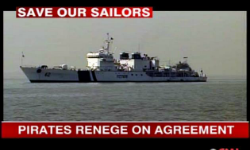A few months ago, I wrote a post entitled Putting political convenience aside, pirates are simply not terrorists. The piece argues that calls to treat all pirates as terrorists are totally unfounded, at least from a legal perspective. This is because, under international law, terrorism and piracy are accompanied by explicitly-defined, mutually exclusive motives.
Although I am standing by my substantive argument, the story of the MV Asphalt Venture is enough – as more astute readers may have noticed – to make me recalibrate my title a bit.

(MarineTraffic.com)
The Asphalt Venture is a Panamanian-flagged, Korean-owned vessel that was captured by pirates on September 28, 2010. On April 15, 2011, the pirates released eight of the Asphalt Venture’s fifteen crew members in exchange for a ransom payment, but the kept the remaining seven crew on board. Subsequently, the pirates issued a demand to the Indian government, particularly to the coastal state of Kerala, that the remaining hostages would not be released until India freed around 100 Somalis convicted of piracy and serving their sentences in India. Recently, the Asphalt Venture pirates have added a $5 million ransom to their list of demands of the Indian government. Old title notwithstanding, these pirates indeed became terrorists.
As I explained in my earlier post, terrorism is characterized by a desire to either incite fear among the general public or to otherwise coerce a government. Conversely, piracy must be committed with the hopes of making money. Thus, where an individual takes hostages on the high seas in hopes of a ransom from a private entity, he is a pirate. Where he takes hostages on the high seas in hopes of shaping the behavior of a government, he is a terrorist.

(IBN Live)
Those who took the Asphalt Venture managed to be both. From September 28, 2010, to April 15, 2011, they were merely pirates, only interested in money moving from one private party to another. But the moment that the pirates engaged the Indian government, actively seeking to affect its behavior, those pirates also became terrorists.
Still, the case of the Asphalt Venture is best seen as an exception that proves the rule. Governments are famous for their refusal to pay ransoms, and pirates generally look to shipping companies and their insurers as the primary source of ransoms. Even with the Asphalt Venture itself, the pirates turned to the insurance company first, received their ransom, and only then did they make non-pecuniary demands of the Indian government.
I ended my last terrorism-related piece by noting that if “pirates tak[e] a less profitable course in favor of a strategy with large political payoff,” the terrorist-pirate distinction would come into play. This is exactly what has happened in the case of the MV Asphalt Venture. In abandoning their private ends in favor of increased political pressure, those who took the Asphalt Venture did not shed the moniker “pirate,” but they certainly gained the additional, arguably even less appealing label, of “terrorist.”
In the end, however, we should continue to be mindful that nothing short of actively pressuring a government to either take or refrain from a certain action can result in an accurate branding with the scarlet “T.” Looking at a single discrete incident to determine an individual’s motives and classify him as a pirate, terrorist, or both is one thing; seeking to apply the blanket term, “terrorist” to all pirates for political convenience is quite another.
Jon Bellish is a Project Officer at the Oceans Beyond Piracy project just outside Denver, Colorado, though the views expressed are solely those of the author. You can follow him on Twitter.


